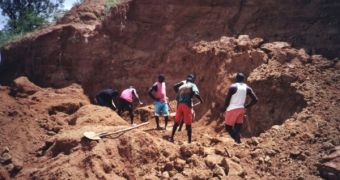The Bangka-Belitung Islands, a part of Indonesia off the coasts of Sumatra, looks like it was just hit by a severe carpet bombing. Helicopter views show large holes in the ground, surrounded by miles and miles of slurry soil dotted by turquoise-colored lakes that are highly-acidic in nature, as a direct by-product of centuries of uncontrolled tin mining.
With Indonesia being the second largest tin exporter in the world, exceeded only by the People's Republic of China, illegal mining in these tin-rich regions is part of daily life. Millions of tons of "poached" tin are smuggled out of the area each year and end up being bought and sold at one of the largest stock exchanges in the world, the London Metal exchange.
National and state authorities have started clamping down on illegal miners and, as a direct consequence, the exchanges in western countries dropped significantly. However, Indonesian officials have no intention of stopping their actions, aimed directly at finally gaining control of the Bangka-Belitung region, which is currently inhabited by more than one million people. They said that, most likely, a 100,000 ton quota will be imposed on national tin exports, in an attempt to save as much of the country's remaining environment as possible.
Plans for restoring the habitats are very difficult to design, especially considering the fact that the reason 40 percent of the population got into tin extraction in the first place was the fact that a huge economic crisis caused a fall in employment statistics. Government representatives are now trying to get people engaged in agriculture, fishing or tourism, but progress is slow, as little to no infrastructure exists to support these activities.
The damage done to the environment in the region will have lasting, long-term effects. Replanting the forests alone will take about half a century and removing mining by-products from the soil to make it sustain agriculture will be very difficult. In addition, local authorities are plagued with poverty, corruption and weak policing, so the chances of anything good happening soon are very remote.

 14 DAY TRIAL //
14 DAY TRIAL //